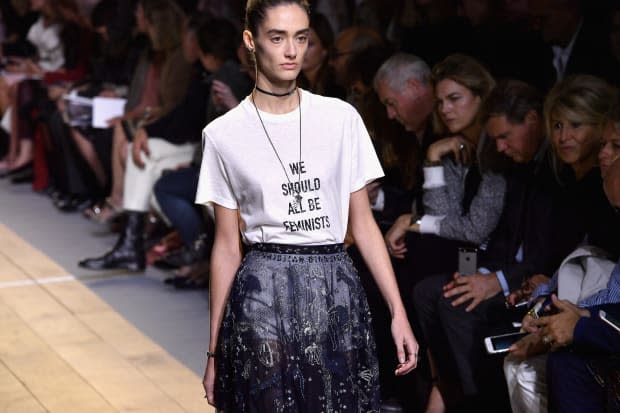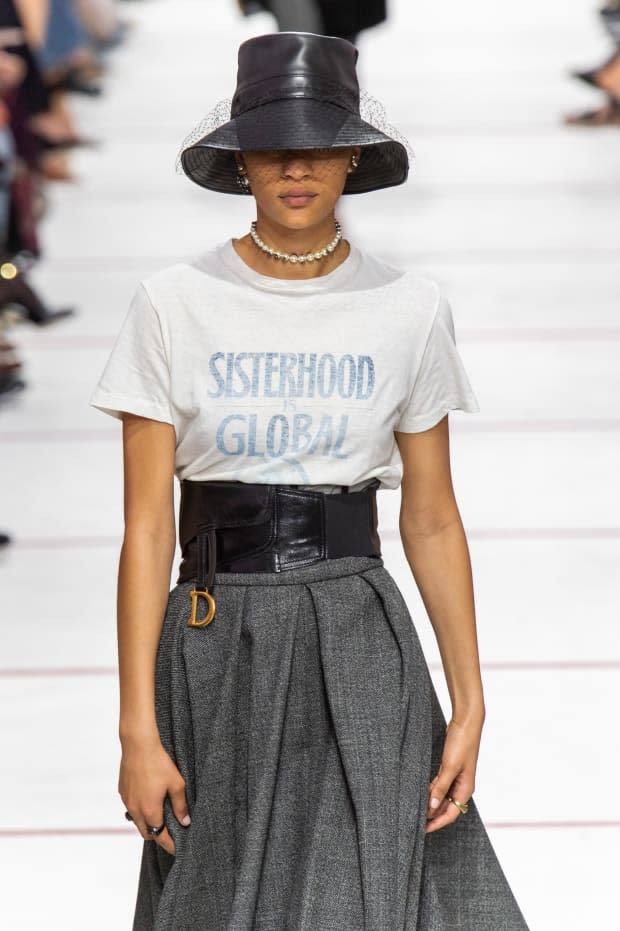Dior, Johnny Depp and the Limitations of Feminism at Big Fashion Brands
- Oops!Something went wrong.Please try again later.
There's no question that fashion itself can (and often, should) be political: As both a reflection of the world in which we live and as the way we choose to present ourselves in society, clothes don't happen in an apolitical silo.
Brands from the luxury sector down to the high street have come under increased pressure to speak out on certain issues or take a stand for something. It has been widely reported that Gen Z in particular values authenticity from companies and is quick to call out perceived hypocrisies. But it was the 2016 U.S. presidential election, especially, that brought conversations around brand values mainstream.
Since then, many big-name labels have responded to pressure from customers and the wider public by launching Diversity and Inclusion programs, introducing circular or environmentally-friendly production practices and tapping activists to serve as brand ambassadors. Others have opted to ignore the conversation entirely. Some have taken a middle-of-the-road approach, weaving popular slogans or signifiers of larger movements into their marketing and product lines. While not all of these moves are automatically regarded as authentic, politically-minded messaging loses all power when there are blatant contradictions within the same brand — like the schism which has emerged between the feminism of Dior's womenswear and its choice of Johnny Depp as its men's fragrance ambassador.
Since landing at the helm of womenswear for Christian Dior in 2016, artistic director Maria Grazia Chiuri has infused her runways and seasonal collections with overtly feminist messaging. Most famously, her debut collection in Spring 2017 included a T-shirt which read "We Should All Be Feminists," a reference to a 2014 essay by Nigerian writer Chimamanda Ngozi Adichie (herself the subject of some controversy in recent years). It quickly became ubiquitous, appearing on celebrities like Rihanna and Jessica Chastain, and serves as the thesis statement for Chiuri's work at the storied French house. (It's also still available for $920.)

Photo: Jacopo Raule/Getty Images For Dior
There have always been limitations to Chiuri's feminism at Dior — for example, it only seems to include one specific body type, even as the rest of the industry moves forward with body diversity (admittedly in fits and starts), and seems limited to cisgender women. But she has always at least seemed earnest in her attempts, collaborating with female artists and finding new angles on the idea each season. And her work has turned Dior into one of fashion's hottest luxury brands, netting LVMH some $7 billion annually.
What's happening over at Dior's fragrance department — which falls under LVMH's Perfumes & Cosmetics division, which is separate from Fashion & Leather Goods — though, makes that messaging feel emptier than ever.

Photo: Imaxtree
The company recently renewed its contract with Depp — in a reported record-breaking, $20 million deal, no less — to represent its Sauvage fragrance for another three years. On Thursday, Dior celebrated the actor's appearances at the Cannes Film Festival (which was met with backlash online), culminating at a Dior dinner, on social media. "Staying true to his inimitable sense of style, it's been a week of Dior men's hits for @JohnnyDepp at the @FestivaldeCannes 2023," the brand's caption begins.
Unmentioned, of course, is the controversy which continues to trail Depp. He filed a much-sensationalized defamation lawsuit filed against ex-wife Amber Heard over accusations of domestic abuse. In April 2022, a jury unanimously ruled in his favor, resulting in a $1 million settlement from Heard. (A similar libel suit filed against a British newspaper ruled against Depp, with the judge stating claims that Depp was violent against Heard were "substantially true.")
View the original article to see embedded media.
Even as Depp seemingly lost out on major Hollywood roles — he claims he was dropped from a potential "Pirates of the Caribbean" sequel and was asked to leave the Harry Potter spinoff series "Fantastic Beasts" — Dior has stood by him, refusing to drop his contract and continuing to post about him on social media. (The @diorbeauty account resumed sharing imagery of Depp in August 2022, and was still posting his Sauvage campaign as recently as February of this year.)
In January, LVMH CEO Bernard Arnault shared that the Sauvage fragrance was "a leader in perfume sales" thanks to the ad spot with Depp. "That's working very well," he said on a call, reported by Glossy. The conglomerate's 2022 full-year report cites the "continued global success of Dior's Sauvage, once again world leader in 2022" as part of its "new record year."
Dior's Instagram post of Depp's appearance at Cannes currently sits at over a million likes — significantly more than other images posted of celebrities at the same event — and is flooded with pro-Depp accounts and comments.
That this lives on the brand's main account, alongside images of Chiuri's feminism-inspired collections, makes it all the more jarring. Of course, as the head of womenswear, Chiuri presumably has no say in menswear (that would be Kim Jones), nor fragrance — a major money driver for most fashion brands. But all these divisions share the same name: Dior.
Depp hardly makes for a feminist-friendly face: It's not up for debate that his relationship with Heard was violent — most of the contention seems to come from who was violent first and in response to what provocation — but anti-Heard messaging has been amplified by men's rights activists and promoted even further by far-right platforms like The Daily Wire. And defamation suits like Depp's have historically been used as intimidation tactics to silence victims of domestic abuse; in March 2022, Marilyn Manson filed a similar suit against ex Evan Rachel Wood. (Manson's suit is not faring as well in court.)
This is not to single out Dior, who's hardly alone in making disjointed attempts at political messaging, whether it concerns sustainability or racial inclusion. But the vast chasm between the feminist messaging of its womenswear (which has proven to be profitable) and continued and vocal support of Depp (whose work for the brand has also added to its profitability) shows how limited major fashion brands — particularly those owned by public companies — are in their ability to ever be true changemakers in society. So long as financial gains are the ultimate bottom line — and, under late-stage capitalism, they always will be — the brands are not our allies. They're just brands.
Never miss the latest fashion industry news. Sign up for the Fashionista daily newsletter.
